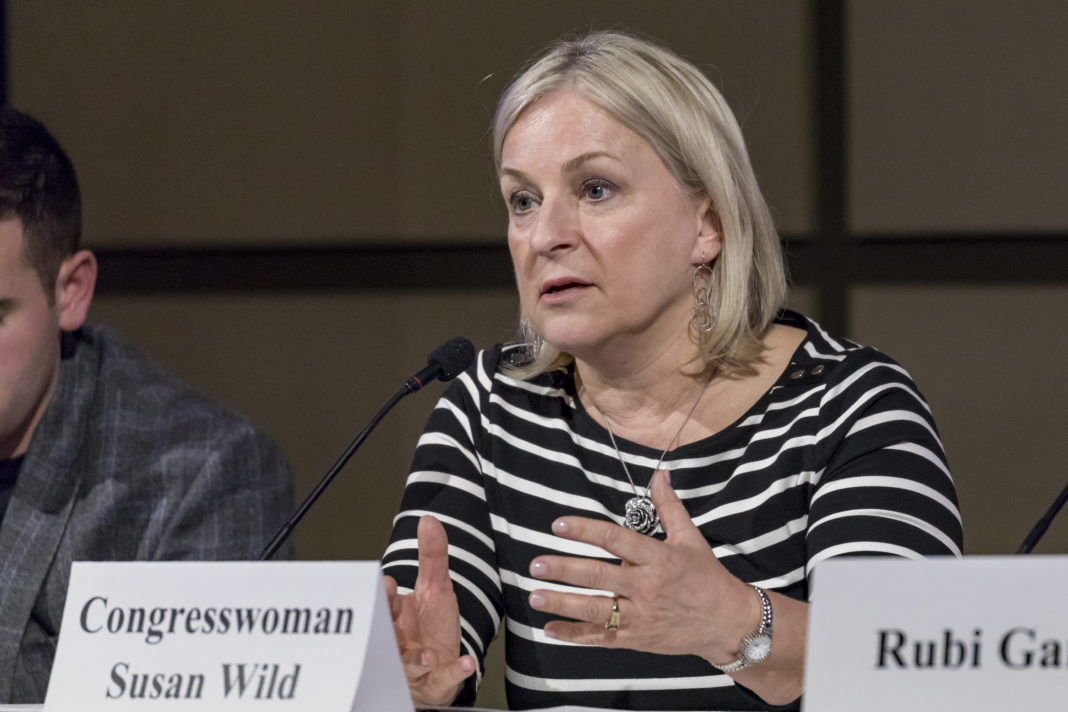“Eight years ago, I was a citizen just interested in being informed in who I would vote for on Election Day; I never thought that I would end up before the Pennsylvania Supreme Court,” said Amanda Holt, Lehigh County Commissioner, during the first panel of Pennsylvania’s Statewide Town Hall on Redistricting on Thursday, Feb. 21. The event was hosted on Muhlenberg’s campus, but live streamed along with over a dozen other institutions across the state each participating in their own campus discussions.
Redistricting, or redrawing a state’s congressional districts on a map, takes place every 10 years, following the Census. The last redistricting took place in 2012, and will occur once again in 2022.
“In Pennsylvania, the process for drawing lines is controlled by the legislature and requires the approval of the Governor,” explained panelist Chris Borick, Muhlenberg College Professor of Political Science & Director of the Muhlenberg College Institute for Public Opinion. “Thus, when a party is in the majority in both houses, and the governor is also of that party at the time of redistricting, the process is prone to partisan preferences [gerrymandering].”
Holt explained how she first noticed issues of gerrymandering in Pennsylvania’s congressional map when she started questioning why her own congressional district included an entire county except a for a small portion of people.
From that realization, her curiosity was piqued, and she began to redraw the congressional districts in a way that, to her, was more logical.
“A little common sense is all it required,” she joked, in regard to redrawing the map.
When she took her drawings to the Legislative Reapportionment Commission, the members refused to listen to her, which is what led her to the Pennsylvania Supreme Court, in a new attempt to address the issue.
“So with no legal training, no co plaintiffs, and no lawyers, I tried to figure out how to present a case to the Supreme Court,” said Holt. “I even called the administrative office to get some help with that.”
While Holt did win the initial case, there still were no significant changes made to the map; redistricting rules were still ignored, and there was no accountability taken. She went back to the PA Supreme Court, but did not prevail in the second case.
Holt encourages people to visit DrawTheLinesPa.com, to work out their own ways of drawing maps that are accurate, fair and representative.
Jill Greene, Executive Director of the Pennsylvania League of Women Voters, was another panelist who has a long history of working with issues of redistricting. Her “nonpartisan grassroots member-led organization” has been fighting for a fair process in redistricting for over 40 years.
One of the most shocking findings that she discussed was how, in 2001, Montgomery Township, Pa. was divided into four separate districts.
“We wound up with maps created in secret, adopted in a very unquestionable way,” explained Greene. “ We wound up with maps that were still not adequate to serve the needs of Pennsylvania.”
Like Holt, Greene’s organization also made attempts to draw the congressional districts to be more compact and continuous. In addition to their own redrawing: From 2007-2008 they lobbied for an amendment to the PA Constitution, in 2008 they attempted redistricting reforms and in 2011 they worked on a campaign for transparency and fairness in the upcoming redistricting process, among many other efforts.
“We’re going to keep going until it’s done and done right,” concluded Greene.
The final panelist for that portion of the town hall was Carol Kuniholm, Fair Districts PA Chair. Kuniholm continuously emphasized that Pennsylvania is within the top five worst congressional maps in terms of gerrymandering in the entire country.
“In 2018, our state legislative districts were 50 percent worse than the two next most badly gerrymandered states: Michigan and North Carolina,” explained Kuniholm.
A proclamation that she repeated throughout her discussion was that “if you’re not angry, then you’re not paying attention.”
A specific instance of gerrymandering that Kuniholm pointed out was how in Butler County, Pa. a university town was isolated so that it would not affect the rest of the county.
Like many of the other panelists, she encouraged an independent redistricting commission, rather than it being done by state legislatures.
She described a cycle of how this redistricting continues to occur: leaders draw district lines, districts are distorted to protect incumbents, incumbents with seniority write the law and then there are unfair procedural processes blocking reform– and thus the cycle continues.
“Unless we find a way to break that tight knot of dysfunction, whatever those policies are that you care about, it’s not going to happen.” Kuniholm proclaimed.
The following panel consisted of Congresswoman Susan Wild of Pennsylvania’s 7th district, Benjamin Lieberman ’19 from Muhlenberg and Rubi Garcia ‘19 from Cedar Crest College.
Lieberman introduced their panel by providing a statistical approach to understanding how gerrymandering may unfairly represent districts. Garcia discussed how bringing up the issue of gerrymandering has led to her receiving criticism due to the controversy surrounding it.
Wild added her support for more fair practices for redistricting, as well as providing specific commentary for her district, which includes the Lehigh Valley.
“I welcome the idea of redrawing these maps,” expressed Wild. “I do believe that we have to do it by way of independent commissions.”
She explained how her district is “very purple,” where it is quite split between the republicans and the democrats.
“The main argument from our point of view is that the new map brings all of the Lehigh Valley together,” said Wild. “To me, that just makes logical sense.”
Sydney Coplin is a senior majoring in Media and Communication. She is currently spending her final semester of college interning and studying in Washington, D.C. She has previously been on staff as News Editor and Managing Editor.






















